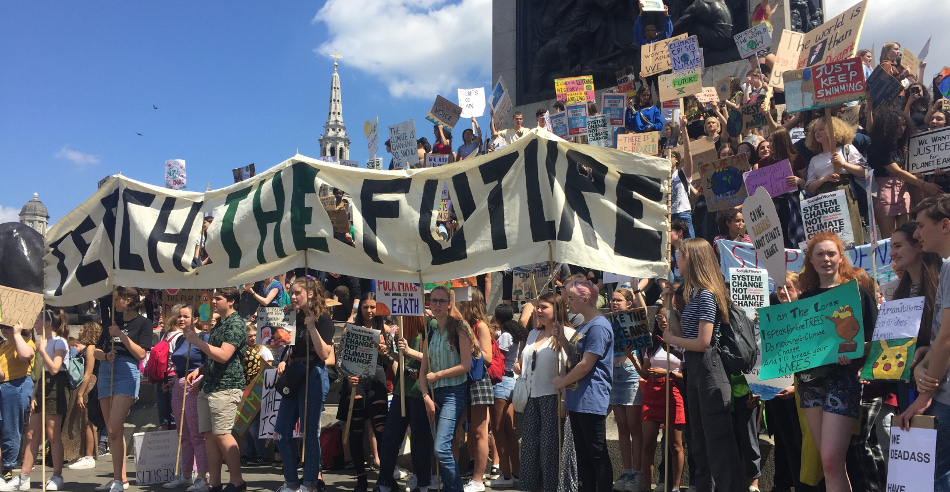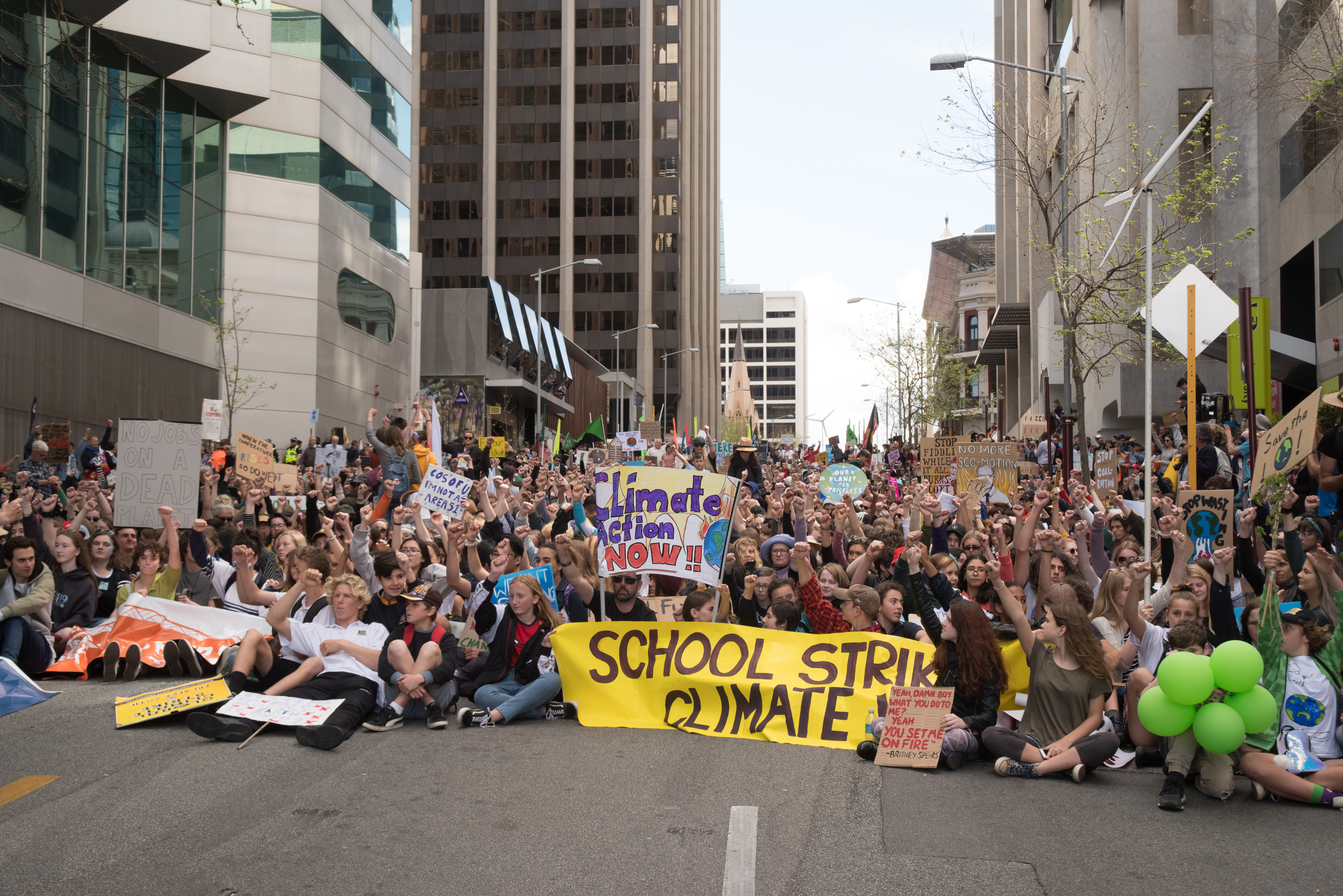Too little, too late? Reflections on the 20 September climate strike
Posted on 02 Oct 2019 Categories: Blog, Climate crisis, Climate justice, The society we want, The state we want
by Caroline Hartnell
The introductory statement to the UN Climate Action Summit on 23 September 2019 makes chilling reading, though it insists that there are still solutions available:
‘The last four years were the four hottest on record, and winter temperatures in the Arctic have risen by 3°C since 1990. Sea levels are rising, coral reefs are dying, and we are starting to see the life-threatening impact of climate change on health, through air pollution, heatwaves and risks to food security.
‘The impacts of climate change are being felt everywhere and are having very real consequences on people’s lives. Climate change is disrupting national economies, costing us dearly today and even more tomorrow. But there is a growing recognition that affordable, scalable solutions are available now that will enable us all to leapfrog to cleaner, more resilient economies.’
On 20 September, three days before the UN Summit, across the globe, millions joined the biggest climate protest ever.
‘In an explosion of the youth movement started by the Swedish school striker Greta Thunberg just over 12 months ago,’ reported Sandra Laville and Jonathan Watts in the Guardian, ‘people protested from the Pacific islands, through Australia, across-south east Asia and Africa into Europe and onwards to the Americas.’ Demonstrations took place in an estimated 185 countries. Some protests had their individual targets – from rising sea levels in the Solomon Islands, to toxic waste in South Africa, air pollution and plastic waste in India and coal expansion in Australia.
‘For the first time since the school strikes for climate began last year, young people called on adults to join them – and they were heard. Trade unions representing hundreds of millions of people around the world mobilised in support, employees left their workplaces, doctors and nurses marched and workers at firms like Amazon, Google and Facebook walked out to join the climate strikes.’
‘We will make them hear us,’ said Greta Thunberg in her speech to the New York climate strike.

Did ‘they’ hear?
First, the press. The Guardian is committed to extensive coverage of climate issues, but what about the rest of the UK press?
For anyone watching the TV news in the UK on 20 September, the climate strike was the lead story – on Channel 4, the BBC, ITV, Sky News. The Independent called it the largest environmental protest in history. The Sun offered a full briefing, everything you need to know about the climate strike. The Evening Standard was reporting ‘incredible images’ of tens of thousands of protesters gathering in Australia before the UK event had even started.
Although the Telegraph led on a negative note with ‘Five climate change protesters arrested as Britain braces for weekend of chaos’, it went on to provide full and sympathetic coverage. The Daily Mail carried a very positive report that ‘Millions of people including hundreds of thousands of children are taking to the streets to demand change’ – although a further article focused on the ‘very disappointing’ phenomenon of ‘dozens of protesters caught with single-use plastic bottles while marching during the Global Climate Strike’ (my own ‘single-use’ plastic bottle has been used dozens of times!).
Is it too late?
Three days later the 2019 UN Climate Action Summit in New York City took place, hosted by UN Secretary-General Antonio Guterre. The declared purpose of this one-day meeting was to ‘bring together leaders from government, business, youth and faith groups to chart an adequate response to the climate emergency facing our planet’. Guterre’s key message: ‘We have no time to lose’.
A flurry of reports before and after the UN Summit underlined the severity of the crisis. The climate science body United in Science warned world leaders gathering for the UN summit that countries must at least triple their carbon emission cut targets if the world is going to limit global heating to 2°C – which is too much: we should be limiting it to 1.5°C, and even that will have dire consequences. The report says current plans would lead to a rise in average global temperatures of between 2.9°C and 3.4°C by 2100, with apocalyptic results. On 25 September, a new report from the Intergovernmental Panel on Climate Change (IPCC) warned that ‘Extreme sea level events that used to occur once a century will strike every year on many coasts by 2050, no matter whether climate heating emissions are curbed or not.’
Some reports strike a more positive note, focusing more on what we can still do. Greenhouse gas emissions could be halved in the next decade if a small number of current technologies and behavioural trends, such as use of solar and wind power, are ramped up and adopted more widely, according to the Exponential Roadmap report from an international group of experts, published on 19 September. Key to any transition will be the growing social movements that are pressing for urgent action on climate breakdown, writes Fiona Harvey in the Guardian. By driving behavioural change, such as moving away from the overconsumption of meat and putting pressure on governments and companies, civil movements have the power to drive the transformation needed in the next decade, say the report’s authors. ‘Social movements will be a top priority because consumers can put pressure on the companies whose goods they buy, and public support makes it possible for political leaders to adopt bolder policies.’
Tragically, as so often happens, domestic crises in the US and the UK overshadowed the UN Summit. So far, 65 countries have said that they will up their national climate targets — but not China, the US or India, the world’s biggest emitters of planet-warming greenhouse gases.

Are governments listening?
A survey from anti-racism group Hope not Hate found that climate breakdown is now viewed as the most important issue facing the world, ahead of migration, terrorism and the global economy, in seven out of the eight countries surveyed, including the UK. In the US it comes third behind terrorism and affordable healthcare. ‘A majority of the public recognise the climate crisis as an “emergency” and say politicians are failing to tackle the problem.’ This recognition is reflected in the response if leafletting about actions on climate change: very unusually, people almost all take a leaflet and engage with you.
It’s true the Labour Party Conference has just voted to commit the party to net zero emissions by 2030, and Ed Miliband has called for a ‘wartime’ mobilisation to tackle the climate crisis. Yet in the ongoing furore over Brexit, it’s hard to see this urgency reflected – among the politicians, even the public. Civil Society News reports a ‘lack of response or concrete policies’ to the climate strikes from ‘multiple top charities’, with the exception of the environmental charities. As Greta Thunberg said to the US Congress on 17 September: ‘You’re not trying hard enough. Sorry.’
The only real pressure is coming from the student climate strikers and their supporters, and from the climate action group Extinction Rebellion, committed to non-violent direct action. A fresh round of climate strikes occurred across continents on 27 September, from New Zealand to Argentina. Following its successful April action, which closed five major London sites for a week and pushed Parliament to declare a climate emergency, Extinction Rebellion is due to begin its next two-week ‘rebellion’ in London on 7 October. The aim: ‘to force their government to #ActNow on the climate and ecological emergency’. Similar events are being planned in Paris, Berlin, Toronto and New York.
These are not traditional ‘organisations’ – they are neither charities nor political parties. These are decentralised global mass movements. Extinction Rebellion describes itself as a ‘do-it-together movement’; it is entirely run by volunteers, many of them full-time. What is extraordinary is that both these movements are barely a year old. Greta Thunberg began her solitary strike outside the Swedish Parliament in September 2018. It was on 31 October last year that Extinction Rebellion held its launch event in Trafalgar Square.
Yet we have known what is happening for decades. The first UN Climate Change Conference (COP) took place in 1995 in Berlin. But scientists’ warnings have been countered by a barrage of climate denial funded largely by the fossil fuel industry. First 9/11 and then the financial crash absorbed the attention of politicians and public. In the UK, Brexit is taking all the air.

Will it be enough?
The question now is: will it be enough? Can we make sufficient change in the short window of perhaps ten years that we have left? In the US and the UK, the Green New Deal offers real answers, but not under our present governments. I carried out a straw poll among members of my family, who were with me at the London climate strike on 20 September.
Jonathan (59): ‘It’s only a year since Greta Thunberg began her solo strike outside the Swedish parliament and Extinction Rebellion began to organise. As one of the thousands in London – and millions around the world – I at last feel a tipping point could be reached to force governments to revolutionise their economies to cut carbon emissions and save ecosystems.’
Anna (40): ‘Being part of what is now a truly global movement demanding action on climate change made me feel both hopeful and anxious – hopeful that this issue might climb to the top of the political agenda where it urgently needs to be, anxious that those in power are too remote from the sense of emergency felt on the ground, and too complicit with corporate capitalism’s mindless drive towards profit and growth.’
Gemma (30): ‘I found it extremely moving to see so many articulate, impassioned young people calling for climate justice. It was incredible to think of everyone across the world protesting about the same thing. I’m not sure if I feel optimistic about governments taking notice, sadly. I feel like the government couldn’t be further from representing the people on those strikes.’
Tara (17): ‘To begin with I was sceptical – I didn’t think that children demonstrating outside Parliament would be noticed by those in power. However, listening to the many young, passionate speakers, feeling the energy that vibrated through the crowds, the raw anger that people felt towards those who were sitting back and doing nothing – it was truly empowering. It made me feel that something can be done, the world is not in fact lost, and we just have to fight for it before it’s too late.’
Maddy (8): ‘I felt furious because millions of people will suffer because of climate chaos, and the people who are creating it are being careless, not even thinking about future generations. I felt hopeful because I saw how many people cared about this and I think we will succeed in making politicians do something.’
I will give the last word to Anna, Maddy’s mother: ‘Maddy enthusiastically took part in the climate strikes and now feels confident that she can change the world. I would like nothing more than for this to be true, but I worry that she and the rest of her generation will be let down.’
We can only hope and pray that we are not too late.
Want to keep up-to-date with more articles like this? Sign up to our newsletter.
Posted on 02 Oct 2019 Categories: Blog, Climate crisis, Climate justice, The society we want, The state we want
